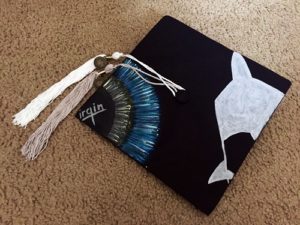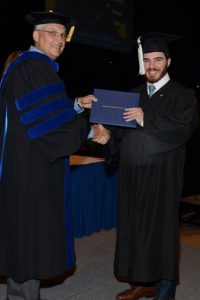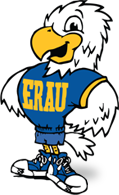Calvin Baker was one of 750 Embry-Riddle students to earn his diploma this May, and one of the first to earn the Commercial Space Operations bachelor’s. Now he’s off to Virgin Galactic to start his career in Quality and Regulatory Compliance for the organization. He’ll be working with SpaceShipTwo and potentially LauncherOne, his dream job with his dream company in his dream location.

Calvin’s graduation cap included his two tassels, one for each degree, and was painted with a silhouette of SpaceShipTwo and his iris (in the style of the Virgin Galactic logo).
How did Calvin land his dream job? Hard work, dedication, making adjustments to meet his goals and participating in internships that provide valuable experience. And he landed not just one, but two internships while a student. We asked Calvin to tell us more about his experiences.
Can you provide some highlights about your internships?
I worked hard to acquire two internships during my time at Embry-Riddle. My first internship took place at the Federal Aviation Administration (FAA) Office of Commercial Space Transportation (AST) in Washington, D.C. Interning at AST was by far the best job I have ever had. When I went into work, I was treated as a full-time employee, not an intern. That meant I wasn’t getting coffee; I was helping to evaluate licenses, experimental permits, and safety approvals. I attended weekly meetings about Virgin Galactic and Scaled Composites and was even able to attend a quarterly meeting for SpaceX. I would greatly enjoy working at AST after graduation.
My second internship was also in Washington, D.C., this time at the Commercial Spaceflight Federation (CSF). CSF is a trade organization, lobbying for the commercial space industry on Capitol Hill. I spent my summer writing congressional hearing reports and newsletters, graphic design for logos and promotional materials, and analyzing the NTSB findings of the October 2014 Virgin Galactic accident in regards to human factors and zero-fault tolerant systems.
Both internships taught me a lot about the space industry and the Washington, D.C., space culture.
Where are you from originally?
I am originally from Delton, Michigan.
What attracted you to Embry-Riddle?
I visited the Daytona Beach campus twice before beginning my freshman year in August 2010. The first time, I fell in love with the campus. The second time, I just had to see the campus again before attending.
Did you start off as a dual degree student?
As with many students, I started off as an Aerospace Engineer. I came to realize it wasn’t what I wanted to do, so I became a Communication major due to my experiences in comms-related courses. In my senior year, fall 2013, I added Commercial Space Operations (CSO) and extended my stay at Embry-Riddle.
Can you tell us a bit about your choices of Communication and CSO?
I chose the Embry-Riddle Communication degree program specifically because of a single faculty member: Professor M.B. McLatchey in the Humanities & Communication Department. I was a notoriously poor writer in high school, with one instance of me rewriting a paper four or five times to ultimately receive a C. However, after taking a couple courses with Professor McLatchey, something just clicked with me and I became a much better writer and communicator. I went on to take nearly every course she offered. This new found skill was compounded by many other great faculty members in that department such as Steve Master, Dr. Stephen Zeigler, Dr. Rachel Friedman, and Stephen Kampa. If you ever want to truly enjoy your coursework, get a degree in Communication from Embry-Riddle. The faculty is remarkable.
I was drawn to the CSO program because it meant a different way to get involved with space after leaving the Aerospace Engineering program. I was no longer chained to a career of marketing and public relations; I could use the skills gained through CSO, in addition to my communication skills, and enter into the space industry performing launch licensing and operations. I was attracted to CSO because it meant I didn’t have to merely talk about people doing great things in the space industry; I could be one of those people doing great things in the space industry.
Your capstone project Mapping Mars’ Moons (M3) addresses many advantages of resource extraction in space. What do you see as the greatest potential and what may be the greatest risk?
The greatest potential is finding resources with enough monetary value to eclipse the GDP (gross domestic product) of an entire country or even the entire world. In our project, we estimated that just one of the moons of Mars could house resources valued at over $10 quintillion, which is 10 with 18 zeroes behind it. This number was calculated based on the cost to launch the resources from Earth and get them to Martian orbit.
The greatest risk is finding out there are no resources at all or that it will cost infinitely more money to extract, refine, and make use of the resources.
We won’t know for sure until we take the risk to send a mission, manned or unmanned, to find out if all of our estimations are accurate.
What do you see as some of the more important careers that will be in demand in the commercial space industry?
Because the industry is just starting out, still designing all of their satellites/vehicles/etc., everyone wants engineers. However, I believe that will change as the commercial space industry matures. I believe it will reach a point when the commercial space industry mirrors the commercial aviation industry. Imagine when you can go online and reserve your ticket to go to space, set up a payload delivery to the Moon, or order some resources for your spacecraft after takeoff. As the commercial space industry matures, you need people to know how to operate in that environment. You won’t need engineers, you’ll need people who understand all aspects of the space industry, which is where I believe CSO will fit quite nicely.
Who are the most important companies and organizations in the commercial space industry?
There are companies taking part in many different areas of the industry: suborbital-trajectory tourism, reusable orbital launches, telecommunications, and so on. In my opinion, I love what Blue Origin and SpaceX are doing in regards to reusability; however, they are not competitors (yet) because Blue Origin is perfecting reusability for a suborbital vehicle and SpaceX is focusing on orbital launch reusability. In terms of tourism, Virgin Galactic just announced their new vehicle, dubbed Unity. Hopefully they’ll be flying paying customers by 2017. That would be a huge step forward for space tourism.
In other words, there are so many companies trying to make their impact in the commercial space industry, that it’s best to say who the leaders are in each area. I only touched on a few above, but it’s safe to say that I’m rooting for anyone who has a business model that includes space activity.
During your studies at Embry-Riddle, what types of extra-curricular activities did you participate in?
Nearly all of my extra-curricular activities included jobs I had, which I made sure would some how assist my professional career. My jobs included being a technical writer at the Florida NextGen Test Bed, the Communications Manager for the Embry-Riddle EcoCAR team, and now the Student Success Coordinator in the Applied Aviation Sciences Department in the College of Aviation. All of these jobs were related to the University and also taught me an enormous amount of valuable skills that complemented my coursework.
As far as student organizations go, I was momentarily in the surf club despite having no idea how to surf. I spent over two and a half years on the Embry-Riddle EcoCAR team, helping to promote the team to the campus, public, and industry. EcoCAR helped me hone all of my communication skills through weekly and monthly deliverables. Lastly, I enjoyed being a part of the Space Sciences, Policy, and Operations Club (SSPOC), which caters to students from the Commercial Space Operations degree program.



